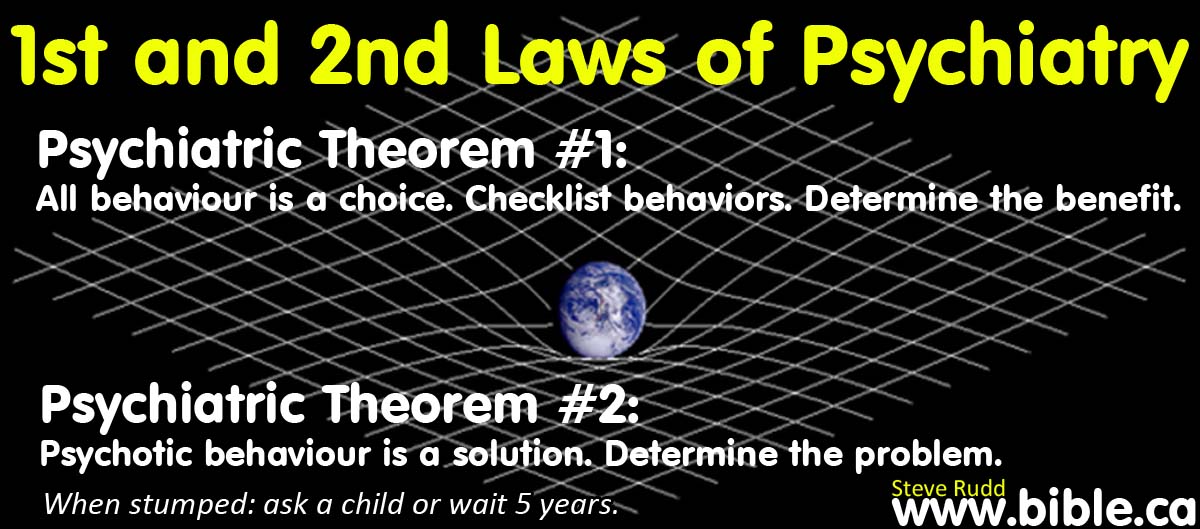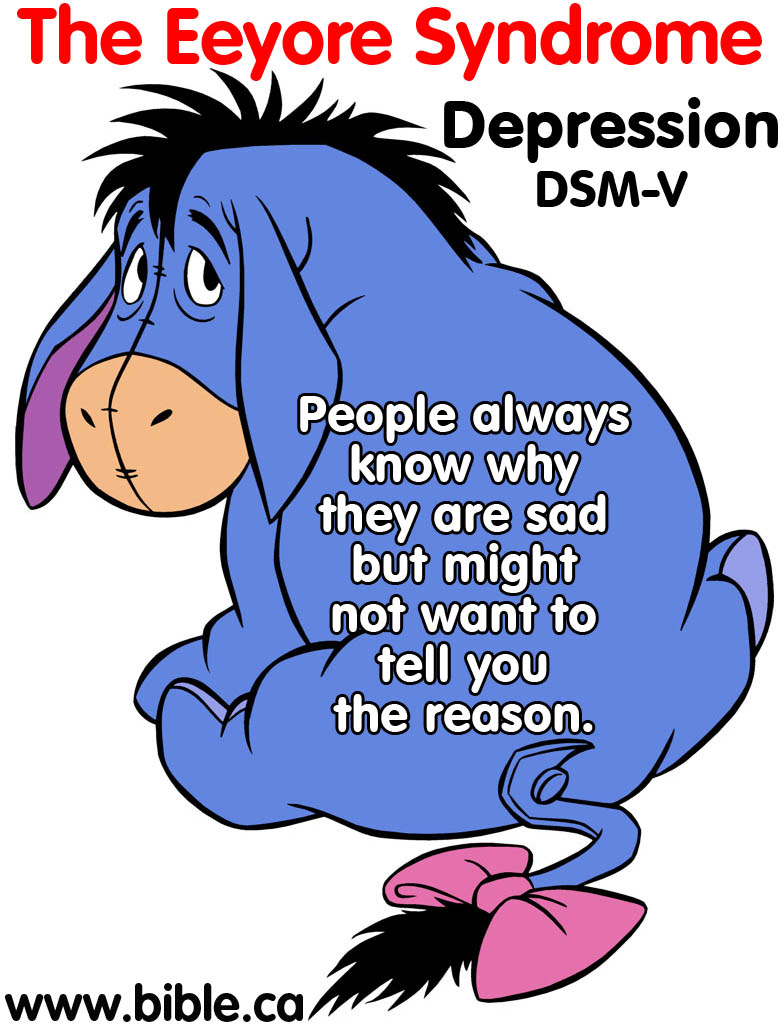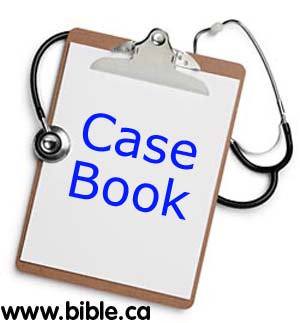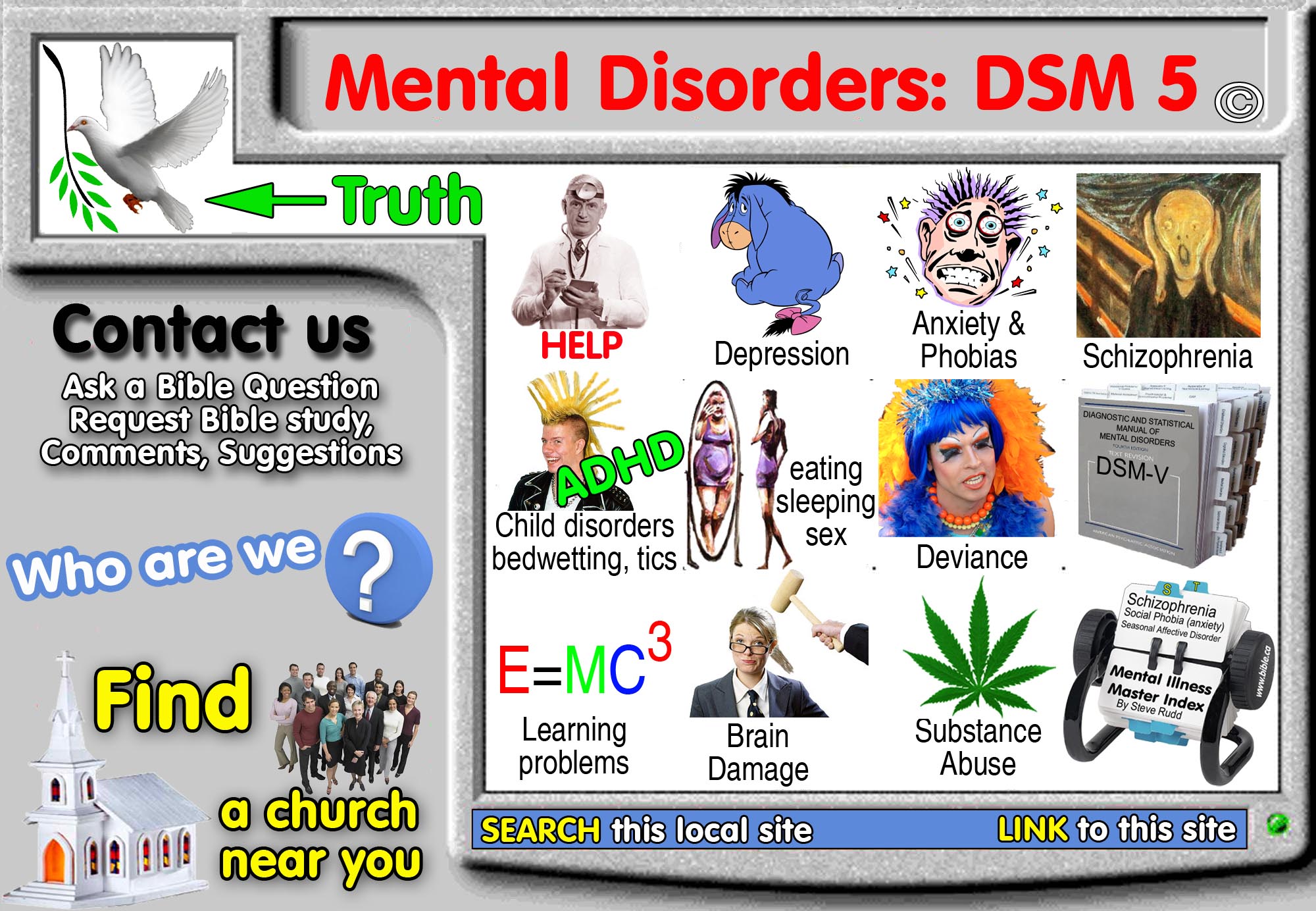The
case of "Eeyore" (Eeyore Syndrome, High self-esteem, Depression)
Also known as "The Snuffaluffagus disorder".
Note: "Eeyore Syndrome: High Self-esteem depression disorder"*** (© Clinical Textbook of Biblical Psychiatry)
***Addition to the DSM-5 is patent pending.
Casebook of Biblical Psychiatry © Version 7
|
Based upon: Real Mental Illnesses |
Casebook of Biblical Psychiatry© brings the principles of Biblical Psychiatry to life based upon real-world cases and familiarizes Christians with different types of situations. This practical companion volume to Biblical Psychiatry© includes not only diagnosis, but also in-depth discussions by experienced Christians for Biblical approaches to treatment. This meticulously detailed volume of dynamic real-life case studies is simply a "must read" for all clinical Psychiatrists, mental health care professionals and Christians interested in expert opinion on today's treatment approaches. Psychiatric students, educators, and practitioners—as well as social workers, nurses, medical physicians, and interested laypersons—will find this unique volume of inestimable value in their day-to-day work.
|
|
|
|
|||||
|
The case of "Eeyore" (Eeyore Syndrome, High-self-esteem, Depression) |
|||||||
|
|
|||||||
|
|
The case of "Eeyore" "Eeyore Syndrome: High Self-esteem depression disorder" |
|
|||||
|
|
Biopsychiatric labels DSM-5 |
Depression, Low self-esteem |
|||||
|
|
Checklist Behaviours DSM-7 |
High self-esteem, narcissism, pride, attention seeking |
|||||
|
|
Insights MMPI-7 |
|
|||||
|
|
Quick Pick EDS-7.1 |
I feel Unrespected I feel Unappreciated I feel Unnoticed |
|||||
|
|
Self-disablement EDS-7.2 |
My negative, sullen, "woe is me" demeanor makes Snuffaluffagus from Sesame Street, look normal, happy and well adjusted. I make my problems the center of discussion and attention when in social gatherings. |
|||||
|
|
Chemical imbalance EDS-7.3 |
None. Fortunately, psychiatrists have not begun drugging stuffed children's animals, although a recent APA study showed that it was an untapped market for the mental health industry to cash in on at the expense of the taxpayer. |
|||||
|
|
Benefits EDS-7.4 |
Fun, entertainment, relief from boredom and monotony: EDS-7.4.2 Attention seeking, Pride, Praise, Honour, Fame: EDS-7.4.3 Sympathy: EDS-7.4.5 Control over others: EDS-7.4.6 Victimhood: EDS-7.4.13 |
|||||
|
|
Monetary EDS-7.5 |
- |
|||||
|
|
Annoyance Scale EDS-7.6 |
Low |
|||||
|
|
Diagnostic Laws EDS-7.7 |
Law of Domino Problem Transference (DPT) EDS-7.7.4.DPT Law of Diagnostic Anosognosia Relativism (DAR) EDS-7.7.7.DAR Law of Psychopathic Modal Catalyst (PMC) EDS-7.7.8.PMC Law of Pediatric Multifarious Obfuscation (PMO) EDS-7.7.12.PMO |
|||||
|
|
Determine the Problem |
Chose to obey earthly father over heavenly Father, guilt, hurt, fear, serving two masters (fathers) |
|||||
|
|
Ask a Child |
Eeyore sure likes everyone talking about him. EDS-7.7.12.PMO |
|||||
|
|
5 years later EDS-7.7.LPT |
In spite of Christopher Robin growing up as a well adjusted productive member of society, sadly, Eeyore is one of those exceptions because he has not improved since 1926. The prognosis does not look good. His Eeyore High Self-esteem Syndrome" is a chronic case. |
|||||
|
|
|
||||||
The case of "Eeyore"
|
The Eeyore Syndrome "High self-esteem depression disorder" |
First here is the clinical information on "Eeyoer's Mental illness"
Excerpts from Winnie the Pooh provide clinical diagnostic data on Eeyore's mental illness:
- EEYORE, the old grey Donkey, stood by the side of the stream, and looked at himself in the water. "Pathetic," he said. That's what it is. Pathetic." He turned and walked slowly down the stream for twenty yards, splashed across it, and walked slowly back on the other side. Then he looked at himself in the water again." As I thought," he said. "No better from this side. But nobody minds. Nobody cares. Pathetic, that's what it is." There was a crackling noise in the bracken behind him, and out came Pooh. "Good morning, Eeyore," said Pooh. "Good morning, Pooh Bear," said Eeyore gloomily. "If it is a good morning," he said. "Which I doubt," said he." Why, what's the matter?" "Nothing, Pooh Bear, nothing. "Why, what's the matter? Is anything the matter? You seem so sad, Eeyore." Said Pooh. "Sad? Why should I be sad? It's my birthday. The happiest day of the year." "Your birthday?" said Pooh in great surprise. "Of course it is. Can't you see? Look at all the presents I have had." He waved a foot from side to side. "Look at the birthday cake. Candles and pink sugar. "Pooh looked--first to the right and then to the left. "Presents?" said Pooh. "Birthday cake?" said Pooh. "Where?" "Can't you see them?" "No," said Pooh. "Neither can I," said Eeyore. ... "It's bad enough." said Eeyore. almost breaking down "being miserable myself, what with no presents and no cake and no candles, and no proper notice taken of me at all, but if everybody else is going to be miserable too [in how they are treating me...]" ... "My birthday still?" "Of course, Eeyore." "Me going on having a real birthday?" "Yes, Eeyore, and I brought you a balloon." "Balloon?" said Eeyore. "You did say balloon? One of those big coloured things you blow up? Gaiety, song-and-dance, here we are and there we are?" "Yes" said Piglet. ... "But Eeyore wasn't listening. He was taking the balloon out, and putting it back again, as happy as could be...." (Winnie-The-Pooh, A. A. Milne, Chapter 6, in which Eeyore has a birthday and gets two presents)
- "It's snowing still," said Eeyore gloomily. "So it is." "And freezing." "Is it?" "Yes," said Eeyore. "However," he said, brightening up a little, "we haven't had an earthquake lately." (Winnie-The-Pooh, A. A. Milne)
- "Nobody tells me. Nobody keeps me informed. I make it 17 days come Friday since anybody spoke to me." (Winnie-The-Pooh, A. A. Milne)
- "One can't complain. I have my friends. Someone spoke to me only yesterday." (Winnie-The-Pooh, A. A. Milne)
Discussion:
Eeyore's clinical diagnoses: "Eeyore Syndrome: High Self-esteem disorder"
1. From a chemical Biopsychiatry point of view, Eeyore clearly had a "mental illness" caused by a chemical imbalance, bad DNA from his parents and a bad case of low self-esteem.
a. But this is all false and the chemical psychiatry industry hasn't got a clue to the truth.
b. There is nothing wrong with Eeyore's brain chemistry and his genes are just fine!
c. Eeyore had high self-esteem, not low self-esteem.
2. The high self-esteem: Eeyore is negative and pessimistic because it is a way of drawing attention to himself and get others to feel sorry for him and try to cheer him up.
a. Eeyore "looked at himself in the water", called himself "Pathetic", then said, "But nobody minds. Nobody cares".
b. Eeyore thinks he deserves a better outward appearance than what he got.
c. This kind of high self-esteem is what causes anorexia, except Eeyore is too lazy to do anything about his appearance, he just wants to get praised by others and get more attention.
d. The truth is, that Eeyore is saying this to people who greatly care about him in order to get some attention from them.
e. Eeyore is smart enough not to complain to people he knows really don't care about him because it would not get him the attention that he seeks.
f. This is pure manipulative narcissism 101.
3. On his birthday, Eeyore is gloomily, sad for what he says is no reason.
a. In fact it is his birthday, which provides this narcissist with an unprecedented opportunity to troll on the waters of self pity for attention and praise.
b. He then sets the bait to get attention: "being miserable myself, what with no presents and no cake and no candles, and no proper notice taken of me at all".
c. Notice what he wants to make him happy: gifts and people taking "proper" notice of him. In other words, notice in proportion to the high value of attention he thinks he is worth.
d. In fact Eeyore is selfishly rallying for more than his normal share of attention. He wants to be the center of attention and talk and efforts to make him happy.
4. In the end, when his friends have paid him all kinds of attention by running for gifts and returning, he is finally happy: "as happy as could be".
5. Eeyore is a bad example for children because it teaches them to pout and put themselves down and act like they are hard done by and unappreciated for the sole purpose of getting toys, candy, praise and the center of attention.
6. Contrary to popular myth, Eeyore is a classic example of high self-esteem, not low.
7. Eeyore is a classic example of how everyone suffering from depression knows exactly why they are sad, but do not want to reveal the reason for fear of anger, rebuke, ridicule and scorn. When Christopher Robin asked Eeyore why he was sad Eeyore had two options:
a. Tell a lie: "I don’t know why I am sad." This garners attention to discover the reason and praise and compliments. This greases the road towards biochemical imbalances in the brain as a medical cause for depression.
b. Tell the truth: "I want to be the center of attention and am getting less praise then what I am really worth." Even children would respond with anger, rebuke, ridicule and scorn if Eeyore told the truth. So Eeyore, like most mental patients, lied and hid the real reason for his "disorder".
Benefits from Eeyore's behaviour: This illustrates the Law of Narcissistic Behaviour Choice (NBC) EDS-7.7.1.NBC
- Fun, entertainment, relief from boredom and monotony: EDS-7.4.2. Being negative was the way Eeyore chose to socialize. He likely was unable to socialize like other children did. It was all he knew. Of course, he would learn as he grew up and as an adult would do just fine. No need to drug him with Ritalin.
- Attention seeking, Pride, Praise, Honour, Fame: EDS-7.4.3. Eeyore is a classic example of trolling on the waters of self-pity for a compliment. The behaviour was clearly attention seeking because he felt he had high self-esteem and did not feel the honour and attention he was getting was up to the standards he deserved.
- Sympathy: EDS-7.4.5. He loved the sympathy as a form of attention where he became the center of attention.
- Control over others: EDS-7.4.6. When in a social environment, Eeyore was able to control the situation by putting himself down and having everyone encircle him with encouragement and flattery. If he did not act the way he did in social environments, he would be just one of many equals or perhaps ignored altogether.
- Victimhood: EDS-7.4.13. Eeyore not only made himself out to be a victim, he blamed others as the victimizers. He blamed them for not paying him the high level of attention and compliments he felt he deserved. His depression was all their fault.
Diagnostic laws that are seen illustrated in the case of "Eeyore":
- Eeyore knew he had some problem but chose to make himself everyone else's problem. It was their fault he was depressed. This illustrates the Law of Domino Problem Transference (DPT) EDS-7.7.4.DPT
- In 100 years from now, when psychiatry has advanced to the point that they have found the biological etiology of depression in children's stuffed toys, Eeyore would be diagnosed with depression and Bipolar as fast as Christopher Robin can say, "Pooh Bear". Of course Eeyore, like all depressed people knew exactly why he was sad, but if he told anyone, they would rebuke him and tell him to grow up. (Oop's, Eeryore is only a 5 year old donkey) When the psychiatrist recommends drugs, Eeyore would reject the diagnosis and treatment because he knows his "Eeyore Syndrome" is a behaviour choice. The psychiatrist, on the other hand is suffering from real Diagnostic Anosognosia (and delusion) because he is unaware that his diagnosis is totally wrong. This illustrates the Law of Diagnostic Anosognosia Relativism (DAR) EDS-7.7.7.DAR
- Eeyore ignored requests to change his annoyingly negative behaviours, but instead sought behaviour changes in others regardless even when it detracted from the beauty and happiness of the moment. This illustrates the Law of Psychopathic Modal Catalyst (PMC) EDS-7.7.8.PMC
- If you asked child, he would say: "Eeyore sure likes everyone talking about him". This illustrates the Law of Pediatric Multifarious Obfuscation (PMO) EDS-7.7.12.PMO
Notice: Note: "Eeyore Syndrome: High Self-esteem depression disorder"*** (© Clinical Textbook of Biblical Psychiatry)
|
"Eeyore Syndrome: High Self-esteem depression disorder" (Addition to the DSM-5 is patent pending) Note: "Eeyore Syndrome: High Self-esteem depression disorder" (© Clinical Textbook of Biblical Psychiatry) Alternate DSM-5 label: "Snuffaluffagus disorder" |
- Through research, we have discovered a new mental illness that we are requesting be added to the DSM-5 as a new disorder: We call it the "high self-esteem depression disorder" and we are applying for a trademark patent. Anyone expect psychiatrists are free to use it without trademark violation as long as they give credit to www.bible.ca.
- We are the pioneers of this new psychiatric disorder that we are requesting be added to the DSM-5. With hundreds of new illnesses being added with each version of the DSM (1I, II, III, IV) We feel that version DSM-5 should list this!
- Clinical information: "high self-esteem depression disorder" is when people lose sleep because they are not living a standard of living as high as they think deserve or getting the respect they feel others owe them! Etiology: High self-esteem. Symptoms: anxious, depressed, sad, conversion to or from "the Eeyore Syndrome", the "woe is me disorder". Cure: Deny yourself, pick up your cross daily, start following Christ and start to serve others.
- Eeyore from Winnie the Pooh, is a perfect example of high self-esteem. Eeyore went around depressed, miserable, unhappy all the time. Why? Several reasons:
- Eeyore wanted others to tell him how good he was. He was trolling on the waters of self-pity for a compliment!
- Eeyore was not getting as much as he felt he deserved. It is like the child who pouts that he did not get as good a toy for his birthday as he was expecting! Rather than be happy with anything he gets, he is afflicted with the Eeyore Syndrome and starts feeling sorry for himself for no good reason.
- Many people get depressed because they are poor with few material possessions. The reason they get depressed is that they feel they deserve more than what they presently have. They fell they are worth more than their present standard of living. This is totally sinful and contrary to scripture.
- "If we have food and covering, with these we shall be content." 1 Timothy 6:8
- "But Martha was distracted with all her preparations; and she came up to Him and said, "Lord, do You not care that my sister has left me to do all the serving alone? Then tell her to help me." But the Lord answered and said to her, "Martha, Martha, you are worried and bothered about so many things; but only one thing is necessary, for Mary has chosen the good part, which shall not be taken away from her."" Luke 10:40-42
- "For this reason I say to you, do not be worried about your life, as to what you will eat or what you will drink; nor for your body, as to what you will put on. Is not life more than food, and the body more than clothing? "Look at the birds of the air, that they do not sow, nor reap nor gather into barns, and yet your heavenly Father feeds them. Are you not worth much more than they? "And who of you by being worried can add a single hour to his life? "And why are you worried about clothing? Observe how the lilies of the field grow; they do not toil nor do they spin, yet I say to you that not even Solomon in all his glory clothed himself like one of these. "But if God so clothes the grass of the field, which is alive today and tomorrow is thrown into the furnace, will He not much more clothe you? You of little faith! "Do not worry then, saying, 'What will we eat?' or 'What will we drink?' or 'What will we wear for clothing?' "For the Gentiles eagerly seek all these things; for your heavenly Father knows that you need all these things. "But seek first His kingdom and His righteousness, and all these things will be added to you. "So do not worry about tomorrow; for tomorrow will care for itself. Each day has enough trouble of its own." Matthew 6:25-34
Note: Although these are based upon real case stories, the names and details have been changed to hide the identities of the people. This practice follows the standards of medical case history publication.
***Addition to the DSM-5 is patent pending
By Steve Rudd: Contact the author for comments, input or corrections.
Send us your story about your experience with modern Psychiatry




